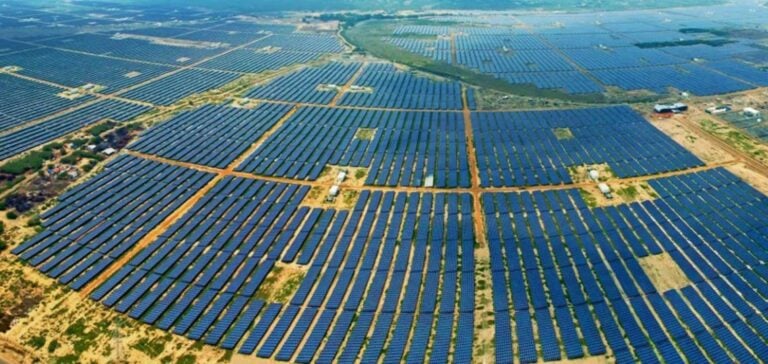Adani Power and Adani Green Energy recently won a joint tender to supply 6,600 MW of renewable and thermal power to the state of Maharashtra over a 25-year period.
This initiative is part of the state’s ongoing efforts to diversify its energy sources and meet growing demand.
The contract includes the supply of 5,000 MW of solar power by Adani Green Energy, from its Khavda renewable energy park, and 1,600 MW of thermal power by Adani Power, from a new power plant.
This project marks a significant step in the expansion of the state’s energy capacities.
Maharashtra, as one of India’s most industrialized states, has a growing need for energy, with consumption expected to reach 200 terawatt-hours by 2028.
It is estimated that 32% of this consumption will come from renewable sources.
Adani Green Energy has already been supplying Mumbai, the state capital, with green energy since March 2023, thanks to its wind-solar farm in Jaisalmer.
This new contract strengthens Adani’s position in Maharashtra’s energy sector, while contributing to the state’s sustainability goals.
Contract details
The contract awarded by the Maharashtra State Electricity Distribution Company (MSEDCL) stipulates that Adani Green Energy will supply 5,000 MW of solar power at a fixed tariff of INR 2.70 per kWh over a 25-year period.
The solar projects will be connected to the Interstate Transmission System and will be developed over a three-year period.
At the same time, Adani Power will sign a long-term power supply agreement for 1,496 MW of thermal power from a new 1,600 MW plant using Ultra-Supercritical technology.
This project is the result of a competitive bidding process, where Adani Power was able to combine its thermal capabilities with those of Adani Green Energy to maximize the efficiency of the offer.
The solar capacity awarded is the largest in the world since 2020, consolidating Adani Green Energy’s position as a leader in India’s renewable energy sector.
In addition, the thermal capacity is the largest awarded to the private sector in India in recent years.
Implications for the energy market
The increase in energy capacity in Maharashtra has significant implications for the Indian energy market.
With the rise of renewable energies, the need to integrate conventional energy sources to stabilize the grid is becoming increasingly crucial.
Anil Sardana, Managing Director of Adani Power, emphasizes that the role of conventional power is essential to sustain economic growth while integrating an increasing share of renewable energy into the grid.
Adani’s projects aim not only to meet growing energy demand, but also to contribute to the country’s energy transition.
Sagar Adani, Executive Director of Adani Green Energy, said that this collaboration with MSEDCL is an important step towards India’s energy independence and building a sustainable future.
The focus is on accelerating the country’s clean energy transition, with ambitious targets for renewable capacity.
Future prospects
Adani Power and Adani Green Energy’s initiative is part of a wider transformation of India’s energy landscape.
As the country strives to meet its sustainability targets, the combination of solar and thermal energy could play a key role in balancing energy needs.
The state’s ability to integrate renewable energy sources while maintaining a reliable power generation base is essential to sustaining its economic development.
Adani’s current and future projects in the energy sector could also influence other market players, prompting similar investments in energy infrastructure.
Current market dynamics, combined with favorable policies, could encourage wider adoption of renewable energies, while ensuring the stability of the power grid.
The next steps for Adani will include implementing projects and managing the challenges associated with the energy transition.
Recent developments in Maharashtra’s energy sector illustrate the growing importance of public-private partnerships in achieving the state’s energy goals.
Companies like Adani play a crucial role in providing innovative and sustainable energy solutions, while meeting the growing needs of an expanding population.






















